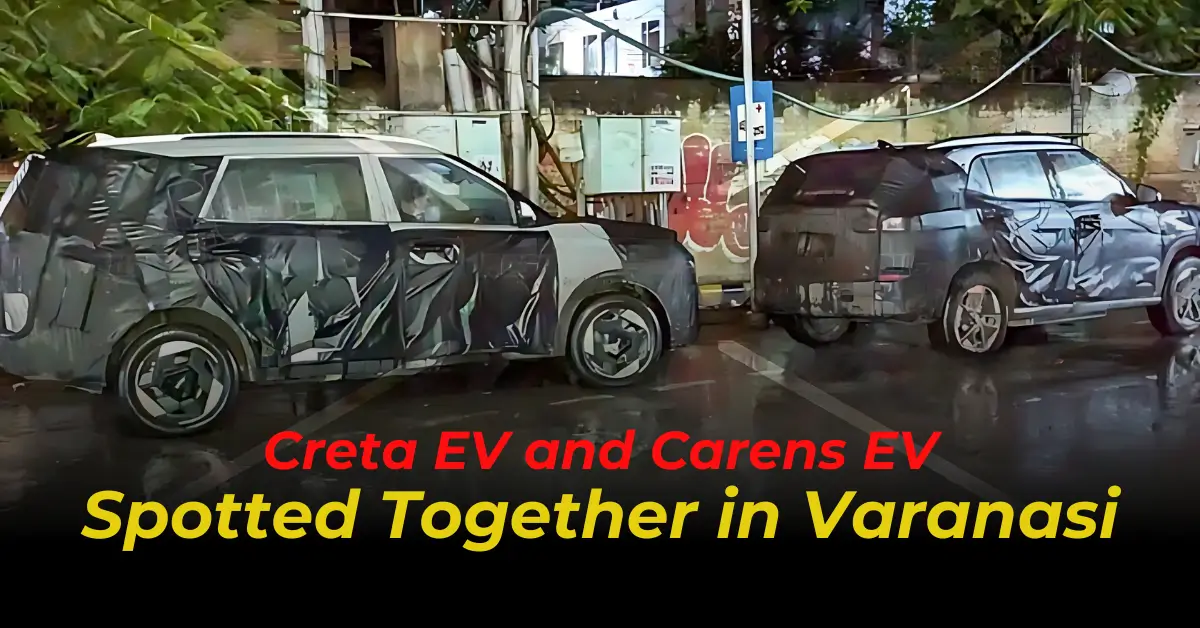
These new models are expected to bring fresh competition to the Indian EV market, offering cutting-edge features and strong performance in their respective segments.
Let’s explore what these premium electric cars from Hyundai and Kia can offer to the buyers:
The Kia Carens EV will be based on the facelifted ICE version of the Carens, which is set to debut in mid-2025. Spy shots reveal new features, such as redesigned alloy wheels and an updated front fascia.
While the exterior will share many elements with the ICE version, the EV variant will come with a stronger suspension system to handle the additional weight of the battery pack.
The Carens EV will likely be available in both 6-seater and 7-seater configurations, with interior features that borrow heavily from its ICE counterpart, including dual 10.25-inch screens and a panoramic sunroof.
Inside, the Kia Carens EV is expected to feature an advanced range of technologies and design cues similar to the upcoming ICE model and EV5. The vehicle will likely include a comprehensive ADAS (Advanced Driver Assistance Systems) suite and top-tier interior features like a 360° camera and a dual-screen setup.
Borrowing from the ICE facelift model, the Carens EV will offer plenty of high-tech options that will make it an attractive choice for families looking for an eco-friendly MPV option.
Aerodynamic alloy wheels are expected to reduce drag, boosting both performance and range. The front fascia will feature a closed-off grille, and unique badging will emphasize its electric nature.
Under the hood, the Hyundai Creta EV is expected to feature a 45-kWh battery pack paired with a 138-hp electric motor. The vehicle is expected to deliver a certified range of around 450 km, while the real-world range is likely to be around 350 km.
The Kia Carnes EV is expected to include a 45kWh battery pack and an electric motor, which is already being used in the entry-level variant of the new-gen Kona EV overseas.
The Carens EV, like the Creta EV, will feature a front-mounted electric motor.
| Specifications | Creta EV | Carens EV |
|---|---|---|
| Battery Capacity | 45 kWh | 45 kWh (expected) |
| Electric Motor | 138 hp | Similar to Creta EV |
| Certified Range | 450 km | 450 km (expected) |
| Real-World Range | 350 km | 350 km (expected) |
| Seating Options | 5-seater | 6-seater and 7-seater |
| Expected Price | ₹20-25 lakh | ₹22-25 lakh |
Hyundai and Kia are positioning their EVs to compete with some of the most popular electric SUVs and MPVs in India.
The Hyundai Creta EV will challenge rivals like the Tata Curvv EV, MG Windsor, and upcoming models like the Mahindra BE.05 and Maruti eVX.
Meanwhile, the Kia Carens EV is expected to go up against the BYD eMax 7, one of the few direct competitors in the electric MPV space.
The Hyundai Creta EV is expected to be launched in January 2025 at a price of Rs 20 to 25 lakh, aimed at attracting customers looking for an affordable electric SUV option.
On the other hand, Kia Motors plans to introduce the Carens EV in June 2025, which will be priced between Rs 22 and Rs 25 lakh.
Both models are expected to offer a strong value proposition for the Indian market, combining advanced technology, performance, and practicality.
As the launch of these EVs approaches, more details about customization, pre-order options, and regional availability are likely to surface.
Both Hyundai and Kia are aiming to provide Indian customers with high-quality electric vehicles that offer competitive performance and range. Their commitment to the EV space is expected to contribute significantly to the growth of electric mobility in India.
Montra Electric, the clean mobility brand of the Murugappa Group, has unveiled its state-of-the-art electric heavy commercial vehicle (eHCV) manufacturing…
The festive season in India is always considered the right time for new purchases — whether it’s gold, gadgets, or…
Ultraviolette Automotive, the Bengaluru-based electric mobility startup behind the F77, has unveiled its most ambitious motorcycle yet: the X47 Crossover.…
The festive season is always a time of high demand, and Montra Electric is making sure no customer has to…
Mercedes-Benz has officially unveiled the GLC Electric at the IAA Mobility show, a move that electrifies its best-selling SUV while…
Noise, in collaboration with TVS Motor Company, has launched India’s first smartwatch that directly integrates with an electric scooter. The…
This website uses cookies.